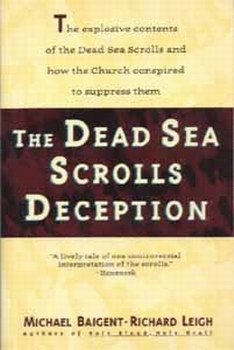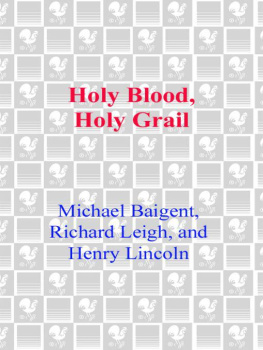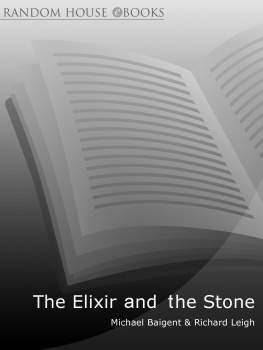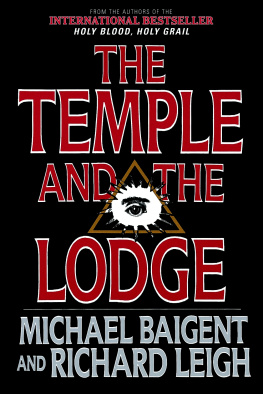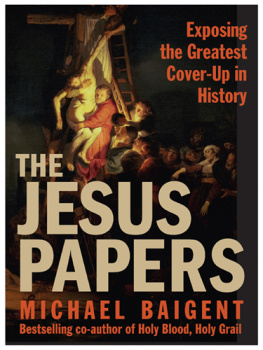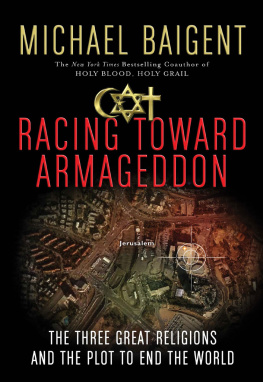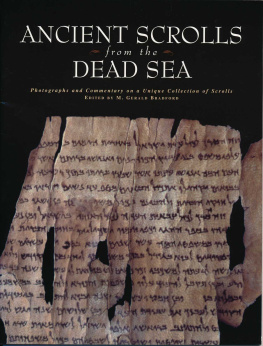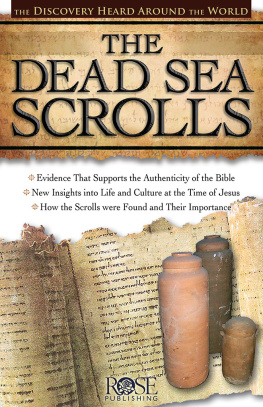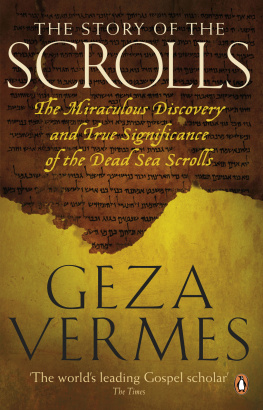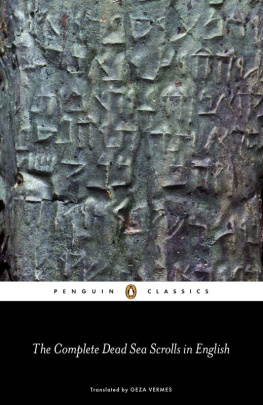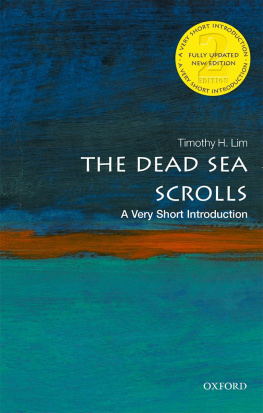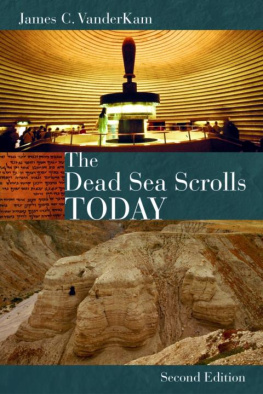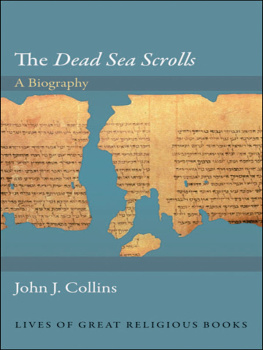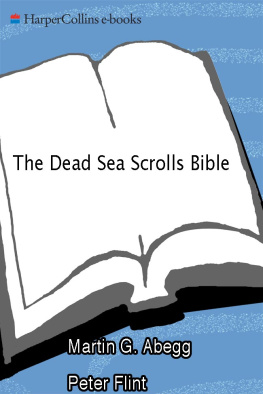Michael Baigent and Richard Leigh
THE DEAD SEA SCROLLS DECEPTION
Labbaye de la fontaine vive,
Avec sa chapelle lucide
Ou Nostres Dames nous genent
Dy habiter dans la cave
Voute.
Les rouleaux de foins
Sous un linceul de sel,
Et la cloche au ficelle
Ou se trouve un seul moin
Maussade.
Mais autour du chastel
Lhraut proclame
La sorcellerie
De la druidesse-dame
Et sa chat sduit le soleil.
Jehan lAscuiz
The authors and publishers would like to thank the following for permission to reproduce photographs:
The executors of the estate of John Allegro (3, 8-10, 14-15, 17, 19-27); Michael Baigent (28-38, 39); Cambridge University Library (I); Israel Antiquities Authority (6-7, 11-13, 18); Israeli Government Press Office (40); William Reed (2); John L. Trever (5); Sabine Weiss/RAPHO (16) and Yigael Yadin (4).
We should like to thank Robert Eisenman for the generosity with which he made available to us his time, his energy and .his insights. We are particularly grateful for the light he has cast on the relationship between the Dead Sea Scrolls and the New Testament, and on the social, political and religious forces at work in the historical backdrop. Our debt to him will become more than apparent in the course of the following pages. We should also like to thank Heather Eisenman.
We should like to thank Mrs Joan Allegro for the access she provided to her husbands material and for her sympathy and support in our undertaking.
We should like to thank the staff of Jonathan Cape, specifically Tom Maschler, Tony Colwell, Jenny Cottom, Lynn Boulton and Helen Donlon; and Alison Mansbridge our editor for her suggestions and the patience she displayed in the most arduous circumstances.
We should like to thank Rod Collins for fostering fiscal well-being and peace of mind.
We should like to thank our agent Barbara Levy for presiding over the project, as well as Ann Evans, who co-instigated it and has now found a new vocation as medium for the wandering and restless shade of Jehan lAscuiz.
Finally, we should like to thank the staffs of the British Library Reading Room, and of the London Library.
And, it goes without saying, we should like to thank our ladies.

THE FOUR DEAD SEA SCROLLS
Biblical manuscripts dating back to at least 200 bc are for sale. This would be an ideal gift to an educational or religious institution by an individual or group. Box F 206.
Such was the advertisement that appeared in the Wall Street Journal on 1 June 1954. Were an advertisement of this sort to appear today, it would no doubt be thought some species of practical joke, not entirely in the best of taste. Alternatively, it might be regarded as a coded message to mask an arms deal, for example, or something involving espionage.
Today, of course, the Dead Sea Scrolls are well enough known, if only by name. Most people, while having an extremely nebulous idea of what they are, will at least have heard of them. If nothing else, there exists an awareness that the scrolls are in some way genuinely precious items, archaeological evidence of immense importance. One doesnt expect to find a specimen of them while digging in ones back garden. One doesnt regard them even as one might the rusted weapons, the domestic utensils and appliances, the remnants of equipment or apparel that might be found at, say, the site of some Roman excavation in Britain.
The discovery of the Dead Sea Scrolls in 1947 generated a flurry of excitement both in scholarly circles and among the general public. But by 1954 that excitement had been skillfully defused. The scrolls, it was assumed, had revealed everything they were going to reveal, and this was made to seem less dramatic than had been expected. In consequence, the advertisement for their sale elicited no particular public interest when it appeared on page 14 of the Wall Street Journal. Immediately below it was an advertisement for industrial steel tanks, electric welders and other equipment. In the adjacent column were lists of premises for rent and situations vacant. It was the equivalent of offering items of Tutankhamuns treasure amidst lots of surplus plumbing or computer supplies. This book will show how such an anomaly could have occurred.
In tracing the progress of the Dead Sea Scrolls from their discovery in the Judaean desert to the various institutions that hold them today, we found ourselves confronting a contradiction we had faced before the contradiction between the Jesus of history and the Christ of faith. Our investigation began in Israel. It was to extend to the corridors of the Vatican, and, even more ominously, into the offices of the Inquisition. We also encountered a rigidly maintained consensus of interpretation towards the content and dating of the scrolls, and came to understand how explosive a non-partisan examination of them might be for the whole of Christian theological tradition. And we discovered how fiercely the world of orthodox biblical scholarship was prepared to fight to retain its monopoly of available information.
For Christians today, it is perfectly possible to acknowledge the Buddha, for example, or Muhammad, as historical individuals, just as one might Caesar or Alexander, and to differentiate them from the legends, the traditions, the theologies that have become associated with them. So far as Jesus is concerned, however, such differentiation is altogether more difficult. At the very heart of Christian belief, history and theology are inextricably entangled. Each suffuses the other. Yet each, if looked at separately, is a potential threat to the other. It is therefore easier, and safer, to blur the demarcation lines between them. Thus, for the faithful, two quite distinct figures are fused into one. On the one hand, there is the historical individual, the man who, according to most scholars, actually existed and walked the sands of Palestine two thousand years ago. On the other hand, there is the man-god of Christian doctrine, the divine personage deified, extolled and promulgated by St Paul. To examine this personage as an historical individual to regard him, that is, as one might regard Muhammad or the Buddha, Caesar or Alexander is still, for many Christians, tantamount to blasphemy.
During the mid-1980s, we were engaged in precisely such blasphemy. In researching the project wed undertaken at the time, we were trying to separate history from theology, to distinguish the historical Jesus from the Christ of faith. In the process, we blundered head-on into the muddle of contradictions that confronts all researchers into biblical material; and like all researchers before us, we found ourselves bewildered by that muddle.
In the kind of research wed embarked on, scriptural accounts, needless to say, could provide only the most meagre aid. As historical documents and testimony, the Gospels, as every scholar knows, are notoriously unreliable. They are essentially accounts of stark mythic simplicity, seemingly occurring in an historical limbo. Jesus and his disciples appear centre stage of an extensively stylised tableau, from which most of the context has been stripped away. Romans and Jews mill confusingly in the background, like extras on a film set. No sense is conveyed of the social, cultural, religious and political circumstances in which Jesus drama is embedded. One is, in effect, confronted with an historical vacuum.
The Acts of the Apostles fleshes out the picture only slightly. From the Acts, one derives at least a tenuous sense of a milieu of internecine strife and doctrinal squabbles amongst Jesus immediate followers, of a coalescing movement which will gradually take the form of Christianity, of a world that extends beyond the circumscribed confines of Galilee and Judaea, of the geographical relation of Palestine to the rest of the Mediterranean. But there is still no accurate rendering of the broader social, cultural, religious and political forces at work. Everything is focused on, and restricted to, St Paul. If the Gospels are stylised, the Acts are no less so, albeit in a different way. If the Gospels are reduced to the stark oversimplification of myth, the Acts comprise a kind of picaresque novel a picaresque novel, moreover, intended for specifically propagandist purposes and with Paul as protagonist. There may be some insight into Pauls mentality, attitudes and adventures, but there is no reliable perspective on the world in which he moved. From the standpoint of any historian, any responsible chronicler, no account of the epoch would have been complete without some reference to Nero, say, and the burning of Rome. Even within Palestine, there were developments of momentous importance to those living at the time. In ad 39, for example, Herod Antipas, Tetrarch of Galilee, was exiled to the Pyrenees. By ad 41, both Galilee and Judaea administered by Roman procurators since ad 6 had been conferred on King Agrippa, and Palestine was united under a single non-Roman monarch (puppet though he might be) for the first time since the days of Herod the Great nearly half a century before. None of these developments is so much as mentioned in the Acts of the Apostles. The effect is akin to reading a biography of, say, Billy Graham which makes no mention of his friendships with presidents and other prominent individuals, no mention of Kennedys assassination, no mention of the civil rights movement, the war in Vietnam, the transformation of values during the 1960s, Watergate and its aftermath.

